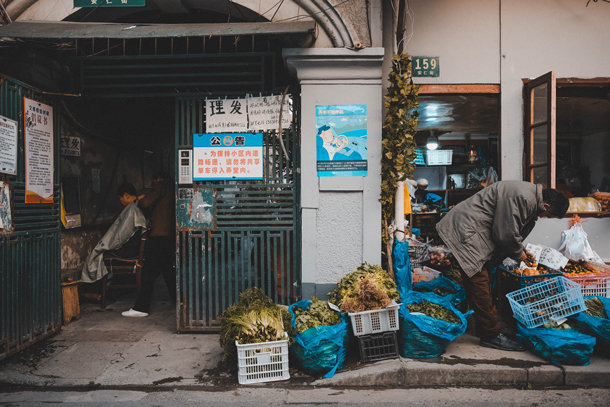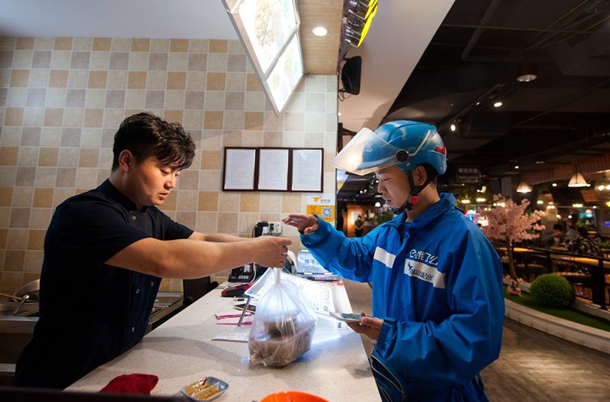China’s Single-Use Plastics Ban
Air Date: Week of February 21, 2020

Single-use plastics are involved in everyday life in China. (Photo: Min G on Unsplash)
As one of the world's biggest users of plastic, China recently unveiled a major plan to phase out single-use plastics across the country. Living on Earth’s Jenni Doering spoke with Ma Jun, founder and director of the Institute of Public and Environmental Affairs, about how the ban could help alleviate China’s growing plastic waste problem.
Transcript
CURWOOD: China produces the most single use plastic of any country in the world, though it’s still behind the US in per capita plastic production. The largest landfill in China is full 25 years ahead of schedule and plastic waste is finding its way to waterways, to the outrage of many Chinese citizens. And the Chinese government seems to be taking the problem seriously. In 2017 they banned the import of most plastics for recycling. And now the country has announced a ban of single use plastics that starts phasing in this year and will broadly forbid the use of consumer single use plastics by 2025. Ma Jun is the director and founder of the Institute of Public and Environmental Affairs, a non-governmental organization in Beijing that has long advocated for holding polluters accountable. He spoke with Living on Earth’s Jenni Doering.
DOERING: Please tell us a little bit about the background of this ban. What led to China's ban on single-use plastics?
MA: China issued the first initial plastic ban years ago, at that time it was just the banning of ultra-thin plastic bags and also requiring all these department stores to charge for the use of plastic bags. There was a certain level of success but on the other hand, socio-economic development in China and the increasing affluent society started consuming far more plastic, especially in recent years, the e-commerce and online food delivery started generating a new round of plastic packaging. So, to tackle this new situation, the Chinese government issued this new plastic ban policy, which is a far more comprehensive response to the ongoing plastic crisis both in China and in the world.
DOERING: Yeah, that's right. I mean you use the word crisis -- what really makes this a crisis? I understand there's a lot of waste that gets you know, spread out into the environment from plastic waste; what's it like there in China?
MA: Yeah, the so-called white pollution caused by the plastic bags and other packaging and other products and styrofoams and all this have been contaminating the soil and also the water, like rivers, I mean much of that got dumped along the river banks and then being washed away into the water and among them, quite a percentage have been carried all the way into the coastal sea and eventually ended up in the big ocean. And we all know that this pollution can lead to an impact on the health of the ecosystem and on the animals and biodiversity and also eventually on public health as well. You know, now I think we understand that there's a cost to be paid. There's a real big consequence. So this plastic policy, I hope can be combined with what we call the Zero-waste Cities program in China because every year we generate over 200 million tons of all this waste food in the plastic, and we simply don't have enough land to dump them. The landfills are being used in a shocking speed.
DOERING: So how does the government plan on enforcing this plan to ban single-use plastics in China? And specifically, how is the government planning to enforce it on the local level?
MA: Yeah, that will be a challenge. In the first round of plastic ban, the success it's somewhat limited. There's a more kind of better enforcement in the big cities and in those higher and shopping malls, but in the farmers market, it was not very successful. And the big challenge now is for this new form of e-commerce, which reached out to hundreds of millions of consumers. And this time, I think the priorities should be given to hold major consumer product brands to hold them accountable. Of course, it's not only about imposing, you know, enforcement and imposing penalty fines on those who violate the policy, it's also about, you know, how to better tap into the market approach to try to collaborate with a business to try to motivate them for innovative solutions.

E-commerce has brought more challenges to plastic waste issues. (Photo: © wxrb.com)
DOERING: So, you know, they're banning single-use plastics with this action in China, but what will substitute the single-use plastic packaging?
MA: Yeah, plastic bags have been so extensively used because of all these advantages, so to try to substitute that the Chinese government is trying to promote the development of biodegradable plastic bags and containers. So, this is one solution. Of course, this is not perfect because these so-called biodegradable plastic bags or containers can only be decomposed under certain conditions. So, it's very important to have alternatives. You know, one of those is for us to switch to more refillable products. You know, when I was young, I grow up using that type of container. And, you know, we have not just the milk delivered in glass bottles to be returned and refilled. But also, even with soy source, or vinegar, they all came, you know, in glass bottles that we need to return and refill. It used to be the practice in those old times in China.
DOERING: I wonder what kinds of interaction you think could happen between efforts in different countries and how maybe innovation can be bolstered by these efforts in China as well as around the world?
MA: Yeah, I think global collaboration on combating plastic waste is extremely important, because plastic waste is somewhat unlike, you know the air and water pollution, which can be more local. This is a bit more like the climate change problem as a threat to the global common good. To try to respond to that it also needs more global cooperation. I hope that globally we could come up with more innovative solutions by collaborating, having the right policy to work with major businesses. I see a big potential there.
CURWOOD: Ma Jun of the Institute of Public and Environmental Affairs in China speaking with Living on Earth’s Jenni Doering.
Links
NYTIMES | "China Says It Will Ban Plastics That Pollute Its Land and Water"
Living on Earth wants to hear from you!
Living on Earth
62 Calef Highway, Suite 212
Lee, NH 03861
Telephone: 617-287-4121
E-mail: comments@loe.org
Newsletter [Click here]
Donate to Living on Earth!
Living on Earth is an independent media program and relies entirely on contributions from listeners and institutions supporting public service. Please donate now to preserve an independent environmental voice.
NewsletterLiving on Earth offers a weekly delivery of the show's rundown to your mailbox. Sign up for our newsletter today!
 Sailors For The Sea: Be the change you want to sea.
Sailors For The Sea: Be the change you want to sea.
 The Grantham Foundation for the Protection of the Environment: Committed to protecting and improving the health of the global environment.
The Grantham Foundation for the Protection of the Environment: Committed to protecting and improving the health of the global environment.
 Contribute to Living on Earth and receive, as our gift to you, an archival print of one of Mark Seth Lender's extraordinary wildlife photographs. Follow the link to see Mark's current collection of photographs.
Contribute to Living on Earth and receive, as our gift to you, an archival print of one of Mark Seth Lender's extraordinary wildlife photographs. Follow the link to see Mark's current collection of photographs.
 Buy a signed copy of Mark Seth Lender's book Smeagull the Seagull & support Living on Earth
Buy a signed copy of Mark Seth Lender's book Smeagull the Seagull & support Living on Earth

